‘The Stairs’ renders Holocaust more than abstraction for generations of viewers
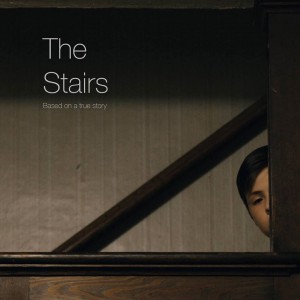 One of the films being screened in Friday’s Florida Short Films Package #1 at the Bonita Springs International Film Festival is The Stairs. It features an elderly man who listens to a tape recording of his father describing his most horrific experience in the Auschwitz death camp during World War II.
One of the films being screened in Friday’s Florida Short Films Package #1 at the Bonita Springs International Film Festival is The Stairs. It features an elderly man who listens to a tape recording of his father describing his most horrific experience in the Auschwitz death camp during World War II.
The film is a short, dense, multi-faceted story susceptible to multiple, sometimes conflicting interpretations. The film starts and ends with a flashback to a night when the man, then a 10-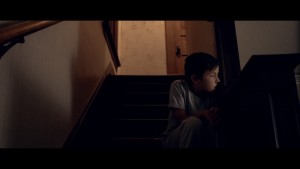 year-old child, sat at the top of the stairs eavesdropping on his parents’ conversation with a couple they’d invited over for the night. It’s a cinematic device that gives the audience a nostalgic point of entry into the terrible story his father tells about how he was spared from being gassed on the day of his arrival at the camp. Most people
year-old child, sat at the top of the stairs eavesdropping on his parents’ conversation with a couple they’d invited over for the night. It’s a cinematic device that gives the audience a nostalgic point of entry into the terrible story his father tells about how he was spared from being gassed on the day of his arrival at the camp. Most people 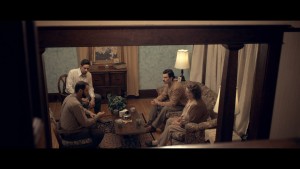 have had the experience of listening in when their parents have company over, whether it’s from the top of the stairs, the hallway around the corner, or some other vantage where discovery is unlikely.
have had the experience of listening in when their parents have company over, whether it’s from the top of the stairs, the hallway around the corner, or some other vantage where discovery is unlikely.
But in this film, the man’s father was cognizant that his son was 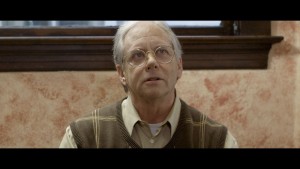 listening in. “He knew I was on the stairs,” says the film’s protagonist. And it is this small, almost throw-away line that draws in the viewer and makes the dad’s story of surviving Auschwitz personal in a way otherwise unimaginable.
listening in. “He knew I was on the stairs,” says the film’s protagonist. And it is this small, almost throw-away line that draws in the viewer and makes the dad’s story of surviving Auschwitz personal in a way otherwise unimaginable.
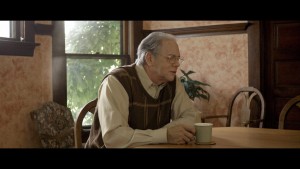 That’s important because Millennials, Gen-Xers and Baby Boomers lack first-hand knowledge of the massive death and incomprehensible horror associated with the Holocaust. When you hear the statistic that 6 million Jews perished during the Shoah, it’s little more than an abstraction.
That’s important because Millennials, Gen-Xers and Baby Boomers lack first-hand knowledge of the massive death and incomprehensible horror associated with the Holocaust. When you hear the statistic that 6 million Jews perished during the Shoah, it’s little more than an abstraction.
 Even the man who devised, implemented and orchestrated Hitler’s Final Solution to the Jewish Problem understood this reality. In the fall of 1944, Adolf Eichmann was with a group of high-level SS officers in a Budapest casino discussing the inevitability of Germany losing the war. One of the officers asked Eichmann point blank whether he was
Even the man who devised, implemented and orchestrated Hitler’s Final Solution to the Jewish Problem understood this reality. In the fall of 1944, Adolf Eichmann was with a group of high-level SS officers in a Budapest casino discussing the inevitability of Germany losing the war. One of the officers asked Eichmann point blank whether he was  worried about what would happen to him when that day finally came.
worried about what would happen to him when that day finally came.
“Eichmann gave a very astute answer that shows he knew how the world worked,” said Nazi hunter Simon Wiesenthal when recounting this story. “‘A hundred dead people is a catastrophe,’ Eichman answered. ‘Six million dead is a statistic.’”
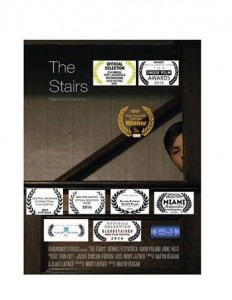 The filmmakers understand this, as well, and thus they provide a number of strategically placed emotional cues in the film in order to make the father’s story both personal and accessible to viewers for whom the Holocaust is just a cold historical fact. But what The Stairs does not address, unfortunately perhaps, is the reason the father chooses to tell his story of survival to an interviewer rather than to his son.
The filmmakers understand this, as well, and thus they provide a number of strategically placed emotional cues in the film in order to make the father’s story both personal and accessible to viewers for whom the Holocaust is just a cold historical fact. But what The Stairs does not address, unfortunately perhaps, is the reason the father chooses to tell his story of survival to an interviewer rather than to his son.
What the father could not, would not share overtly with his boy was the guilt that never left him for living when everyone else died. “And that’s how I failed,” he says at the end of his story, describing how he picked up his clothes, quickly put them on, and  never looked back at the columns of naked Jews being herded like cattle into the gas chambers not far from the train depot that had brought them to the very gates of hell. Where others saw in him bravery and endurance, the father saw only cowardice and shame.
never looked back at the columns of naked Jews being herded like cattle into the gas chambers not far from the train depot that had brought them to the very gates of hell. Where others saw in him bravery and endurance, the father saw only cowardice and shame.
The Stairs is an independent film directed by Hakym Reagan and produced by Blake Laitner and Mort Laitner. The cast includes Dennis Fitzpatrick, David Poland, Anne Voxx, Daniel Timothy Treacy, Peter Glazer, Drew Thacher, Elizabeth Zimmerman and Max Albright.
January 26, 2017.
RELATED POSTS.
 BIFF opens with red carpet entry, ‘Our Last Tango,’ and Opening Night Party
BIFF opens with red carpet entry, ‘Our Last Tango,’ and Opening Night Party- ‘Our Last Tango’ is spellbinding love story set against background of dance
- What the critics have said about ‘Our Last Tango’
- Meet ‘Our Last Tango’ filmmaker German Kral
- Friday’s schedule of BIFF films in the Moe Auditorium & Film Center
- Friday’s schedule of BIFF films in the Hinman Auditorium














 Tom Hall is both an amateur artist and aspiring novelist who writes art quest thrillers. He is in the final stages of completing his debut novel titled "Art Detective," a story that fictionalizes the discovery of the fabled billion-dollar Impressionist collection of Parisian art dealer Josse Bernheim-Jeune, thought by many to have perished during World War II when the collection's hiding place, Castle de Rastignac in southern France, was destroyed by the Wehrmacht in reprisal for attacks made by members of the Resistance operating in the area. A former tax attorney, Tom holds a bachelor's degree as well as both a juris doctorate and masters of laws in taxation from the University of Florida. Tom lives in Estero, Florida with his fiancee, Connie, and their four cats.
Tom Hall is both an amateur artist and aspiring novelist who writes art quest thrillers. He is in the final stages of completing his debut novel titled "Art Detective," a story that fictionalizes the discovery of the fabled billion-dollar Impressionist collection of Parisian art dealer Josse Bernheim-Jeune, thought by many to have perished during World War II when the collection's hiding place, Castle de Rastignac in southern France, was destroyed by the Wehrmacht in reprisal for attacks made by members of the Resistance operating in the area. A former tax attorney, Tom holds a bachelor's degree as well as both a juris doctorate and masters of laws in taxation from the University of Florida. Tom lives in Estero, Florida with his fiancee, Connie, and their four cats.